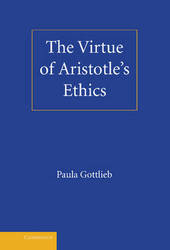
|
The Virtue of Aristotle's Ethics
Hardback
Main Details
| Title |
The Virtue of Aristotle's Ethics
|
| Authors and Contributors |
By (author) Paula Gottlieb
|
| Physical Properties |
| Format:Hardback | | Pages:262 | | Dimensions(mm): Height 229,Width 155 |
|
| Category/Genre | Western philosophy - Ancient to c 500
Ethics and moral philosophy |
|---|
| ISBN/Barcode |
9780521761765
|
| Classifications | Dewey:185 |
|---|
| Audience | | Professional & Vocational | |
|---|
|
Publishing Details |
| Publisher |
Cambridge University Press
|
| Imprint |
Cambridge University Press
|
| Publication Date |
27 April 2009 |
| Publication Country |
United Kingdom
|
Description
While Aristotle's account of the happy life continues to receive attention, many of his claims about virtue of character seem so puzzling that modern philosophers have often discarded them, or have reworked them to fit more familiar theories that do not make virtue of character central. In this book, Paula Gottlieb takes a fresh look at Aristotle's claims, particularly the much-maligned doctrine of the mean. She shows how they form a thought-provoking ethic of virtue, one that deserves to be developed and refined. The first part of the book addresses the nature of virtue and the virtues, illuminated by the doctrine of the mean. Building on the conclusions of this analysis, the second part explains the mentality of the good person and the type of society that will allow such a person to flourish.
Author Biography
Paula Gottlieb is Professor of Philosophy and Affiliate Professor of Classics at the University of Wisconsin, Madison. She was educated at Oxford and Cornell. The author of an analysis and commentary on Aristotle's Nicomachean Ethics I and II for Project Archelogos, she has received fellowships from the Center for Hellenic Studies, Washington, DC, and the Institute for Research in the Humanities at the University of Wisconsin, Madison.
ReviewsReview of the hardback: '... a well-written, clearly argued, and consistently interesting contribution to the literature on Aristotle's ethics. It sheds useful light on a wide range of important topics, charitably engages the work of other scholars, and capably defends the viability of Aristotle's ethical theory. Whether they are looking only for discussions of specific topics, or for a fuller defense of the doctrine of the mean, scholars of Aristotle's ethical and political thought will find Gottlieb's book worthwhile.' Bryn Mawr Classical Review
|